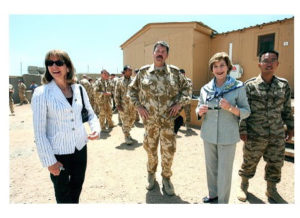Following her Wall Street Journal op-ed on August 25 and the U.S. withdrawal from Afghanistan on August 31, the Naval War College Foundation sat down with NWCF Trustee Ambassador Paula J. Dobriansky to discuss the recent developments in Afghanistan.
Naval War College Foundation Trustee Ambassador Paula Dobriansky served as Under Secretary of State for Global Affairs from 2001 to 2009, a position that took her to Afghanistan many times. After American forces secured Mazar-i-Sharif in 2001, she was heavily involved in State Department and Department of Defense efforts to assist the Afghan people. Her broad portfolio covered, among other issues, international narcotics and law enforcement, human rights, refugees, health issues and Afghan women. Ambassador Dobriansky was a Founding Co-Chair of the U.S. Afghan Women’s Council. The Council was established to focus on women’s education, economic empowerment, free and fair access to health clinics, and the rule of law and governance. Former First Ladies Laura Bush and Hilary Clinton serve as honorary Co-Chairs of the Council and Dobriansky continues to be an active member.

Ambassador Paula Dobriansky, Under Secretary of State for Global Affairs, with First Lady Laura Bush in Afghanistan at New Zealand’s Provincial Reconstruction Team (PRT) in Bamiyan.
Since leaving government service, Ambassador Dobriansky has remained closely involved with helping the Afghan people. She has served on the Board of the American University of Afghanistan and is Chair of the Women’s Initiative Policy Advisory Council (WIPAC), Mrs. Laura Bush’s initiative at the George W. Bush Presidential Center. The top priorities of WIPAC include providing educational opportunities for Afghan young girls, reducing the maternal mortality rate, ensuring Afghan women have the right to own their own businesses, and assisting Afghan women who are in positions of leadership. From 2001-2021, the Afghan maternal mortality rate was more than halved, 30% of civil servants are Afghan women, and the number of children enrolled in grades 1-12 rose from .9 million (with almost no girls) to 9.2 million (39% girls).
As Vice Chair of the Atlantic Council Scowcroft Center for Strategy and Security, Ambassador Dobriansky also moderated an Afghanistan series focused on accomplishments and in which Rear Admiral Shoshana Chatfield, current President of the U.S. Naval War College, participated. The Admiral commanded a provincial reconstruction team in Farah Province and discussed the strides made in that province.
With this experience Dobriansky has been closely watching the events play out in Afghanistan over the past several months, and it is what prompted her to co-author an op-ed in the Wall Street Journal on August 25. In the op-ed, she and Paul Saunders advocate for the adoption of a safe zone resolution by the United Nations Security Council in order to facilitate the safe evacuation of Americans and Afghan allies prior to the withdrawal of U.S. forces from the country. Their warning that “allowing crowds and chaos to grow at the limited access points to the airport is dangerous. A single terrorist bomb at one of these points could kill tens or hundreds of Afghans as well as U.S. military personnel and evacuees” proved to be all too prescient; the following day, 13 American service members and scores of Afghans were killed in just such an attack.
“We believed that a U.N. Security Council resolution would have advanced efforts to expand the existing safe zone that the U.S. military had already established within Kabul Airport,” said Dobriansky. “It would have created corridors enabling evacuees to be able to reach the airport and, most importantly, bring them under American and Allied protection.”
“However, what unfolded was a debacle of enormous proportions. The killing and carnage was tragic and could have been prevented,” she commented.
Although American forces have now withdrawn from the country, thousands of individuals remain who still wish to leave, including some American citizens. The Ambassador observed that even though U.S. leverage is now limited, there is a need to be steadfast in efforts to secure the safe passage out of Afghanistan for American citizens, foreign nationals, and Afghan allies who seek to leave.
“The administration has indicated that we are now in a chapter of diplomacy, but diplomacy decoupled from the credible use of force cannot be effective. Without a strong military foundation, the effectiveness of diplomatic overtures is much reduced,” warned Dobriansky. “I think that we should forge an international coalition or network to apply a significant amount of pressure on the Taliban to ensure the free, unencumbered passage of evacuees.”
Ambassador Dobriansky sees international pressure being enhanced. After her op-ed was published, French President Emmanuel Macron, British Prime Minister Boris Johnson, and German Chancellor Angela Merkel proposed the establishment of a safe zone in the UN Security Council. The resolution passed, with China and Russia abstaining. “It is clear to me that when countries are unified in exerting sustained international pressure on the Taliban, they can have an impact,” asserted Dobriansky.
In addition to the need to assist evacuees, there is an ongoing humanitarian crisis in Afghanistan that Ambassador Dobriansky is concerned will be magnified under Taliban rule. There is already a shortage of food, clothing and shelter in Afghanistan, and she thinks the crisis itself can go beyond what exists today. “There has to be a sustained strong effort by governments, private business, NGOs, academia and journalists to ensure that the humanitarian situation remains in the forefront of news and continues until the situation has abated. There has to be a global outcry,” she stated.
And, crucially, there remains the dilemma as to how to provide assistance without empowering the Taliban. “I’m gravely concerned about actions by the Taliban which have pointed to the creation of a terrorist haven in Afghanistan. The challenge is to provide assistance without enabling their agenda.”
American citizens can help. Dobriansky strongly encourages concerned individuals to write to their members of Congress about the need to take action. Contributions to those institutions and NGOs who assist and resettle Afghan refugees are most welcome. To date, some 24,000 Afghan refugees have arrived in the United States. The Ambassador stressed the need to integrate them into American society and communities. “Providing Afghans who come to the U.S. with food, shelter, job and educational opportunities is most meaningful,” she commented.
Ambassador Dobriansky is staunchly committed to the people of Afghanistan—a commitment that was forged 20 years ago during her government service. She does not want to see our Afghan allies abandoned, given their years of dedicated support to our service members. Dobriansky emphasized that we must make sure that Afghanistan does not serve as a launching pad for another terrorist attack against America. She asserted, “This is our solemn and sacred duty.”
Ambassador Dobriansky brings her national security expertise to the NWCF Board of Trustees in support of the mission of the U.S. Naval War College (USNWC) to educate and develop future leaders by building strategic and cultural perspective and enhancing the capability to advise senior leaders and policy-makers. Graduates of the USNWC must be prepared to meet the strategic and operational challenges of today and tomorrow, and guidance from trustees like Ambassador Dobriansky help to ensure that the NWCF’s program funding priorities are not only in line with those of the President of the U.S. Naval War College, but of our Navy and Nation as well.
Note: The views reflected herein are those of Ambassador Dobrianksy and do not necessarily reflect those of the Naval War College Foundation.
